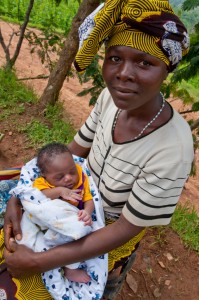Posted on May 15, 2012
Submitted by Landesa
In honor of Mother’s Day last weekend, Landesa addressed a letter to mothers in the developing world:
 On this Mother’s Day, Landesa salutes mothers in the developing world – our partners.
On this Mother’s Day, Landesa salutes mothers in the developing world – our partners.
We advocate for your land rights not just because it is a good idea – but because it is essential for alleviating poverty.
We know that when you have secure rights to the land that you cultivate, you improve the land, which increases your yields. We know that you use those higher yields and extra income to meet your families’ needs, boosting family nutrition and health, and ensuring that your children stay in school.
We spend our time in the field listening to you. And from China to Rwanda, and India to Uganda, we hear the same refrain: you need secure rights to land.
So that your children will have a better future. A future free of conflict.
And a future full of prosperity.
Mothers, we hear you.
With you and your governments as our partners, we will continue to help you obtain a powerful tool you can use to break the cycle of poverty – secure rights to land.
~ The global Landesa team
Posted on May 9, 2012
In one of the few sunny days of Seattle’s early spring, over fifty people traveled to iLEAP’s presentation and meeting space for Global Washington’s Second Global Workers event. The second installation of this series asked speakers Andrea Ballard and Deborah Agrin to dissect a question that many current and prospective professionals struggle with: What is it that employers really want?
Andrea Ballard, Human Resources Consultant and Career Coach, and Deborah Agrin, current Director of Development and Engagement at Vittana, both brought different perspectives on the job hunt to their talks. The event began with a networking skills workshop led by Ballard. All attendees were asked to practice networking skills they would soon use with employers with each other; and began meeting fellow professionals in the process. The event culminated with a question and answer session addressed to both speakers to build on each other’s perspectives. When asked for final tips, Agrin suggested “be[ing] curious and experiment[ing]”. Ballard implored attendees to “get out of [their] houses and away from [their] computers” when applying for jobs.
But what experimentation did Agrin mean? What did Ballard suggest other than endlessly filling out job applications over the internet?
Both speakers attested to the need of certain skills in the development community, and both speakers assured the audience that those skills could be refined in a number of environments. In short, a perfect candidate for the development field may not come from the development field. Project management is one capacity that the audience was told employers find impressive. The ability to set targets, plan strategically to carry out an assignment, and follow through is a necessity in a field where funding is always at risk. Impact evaluation was also cited as an attractive ability. The speakers pointed out that specialists in statistical analysis, research, or project design could find their skill sets welcomed in this field. Finally, business management was highlighted. Knowing how to do what you say and knowing how to run projects and organizations efficiently makes candidates more competitive.
Both speakers also noted that the most effective people in this field are those with a certain faculty of flexibility. A person who has lived overseas demonstrates that they can survive and work in another culture while a person who is entrepreneurially minded demonstrates a mental agility to take advantage of opportunity where others may not.
When the conversation turned to resumes, several points stood out. Ballard advised applicants to list job accomplishments rather than job duties on their resumes. Often an employer has a partial idea of what you do based on the title you’ve been given. Using your resume as a way to elaborate on how well you did a job or how you did your job differently than most is a good way to display competence in the small space on a resume. Displaying a fluency in different kinds of language is also a skill that many possess but few use their resume to highlight. “Good communication skills” is a common resume phrase. A phrase like “able to adjust communication to fit written, verbal, and business settings” may more accurately describe the importance of your communication abilities.
Ultimately, both speakers were at the event to illuminate the many paths a person with ambitions to enter the development field could take. Recent graduates and students were encouraged to take on all the internships and fellowships they could to accumulate direct experience and responsibility. Mid-career professionals were urged to leverage the skills they’ve already acquired to interview better and build up their resumes. Global Washington thanks the speakers, and those that were able to attend the workshop. We look forward to seeing you all at the next event in the Global Workers series.
by Bryan Gamble
Posted on May 3, 2012
The Seattle Foundation’s “GiveBIG” campaign generated $7.43 million in online contributions for nonprofits attracting more than 37,800 individual donations! This year’s astounding results more than double last year’s donations totaling $3.6 million. Thank you to all of those in King County and across the globe who gave generously to Global Washington and our 160+ member organizations! The “GiveBIG” 2012 results are a remarkable testament to the strong community spirit and philanthropic drive that defines King County and Washington State.
For more information on The Seattle Foundation’s “GiveBIG” campaign, check out their website:
http://www.seattlefoundation.org/news/Pages/GiveBIGBringsin7MillionDoubling2011Results.aspx
 On this Mother’s Day, Landesa salutes mothers in the developing world – our partners.
On this Mother’s Day, Landesa salutes mothers in the developing world – our partners.